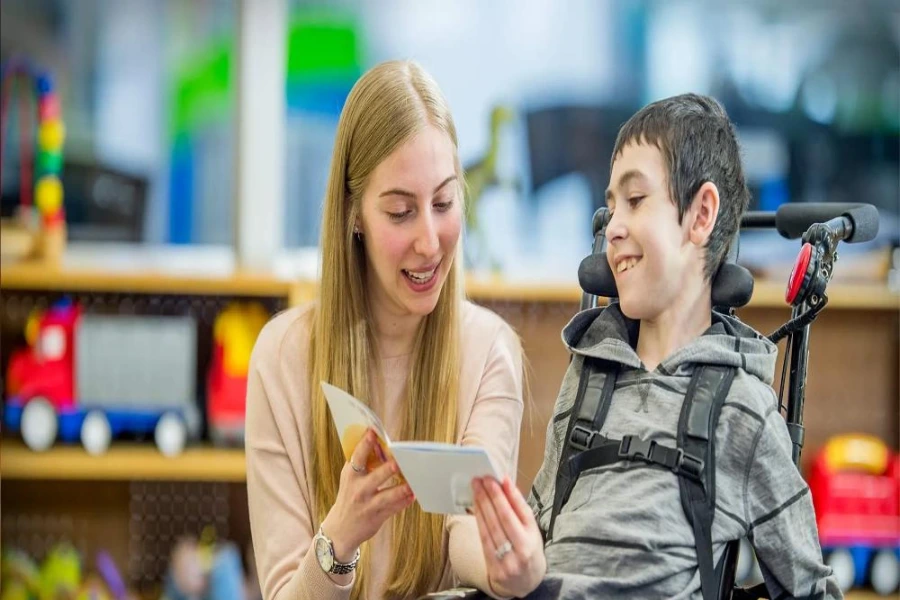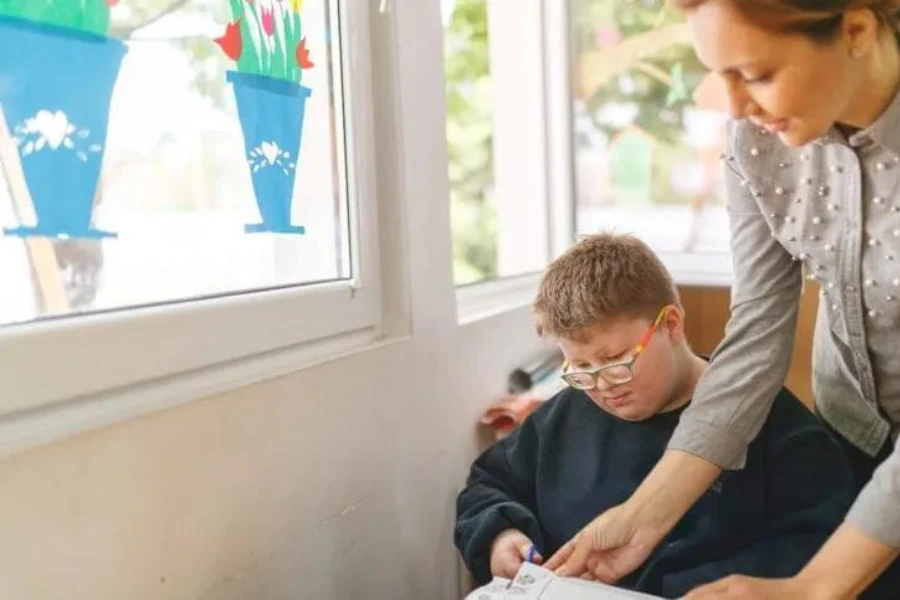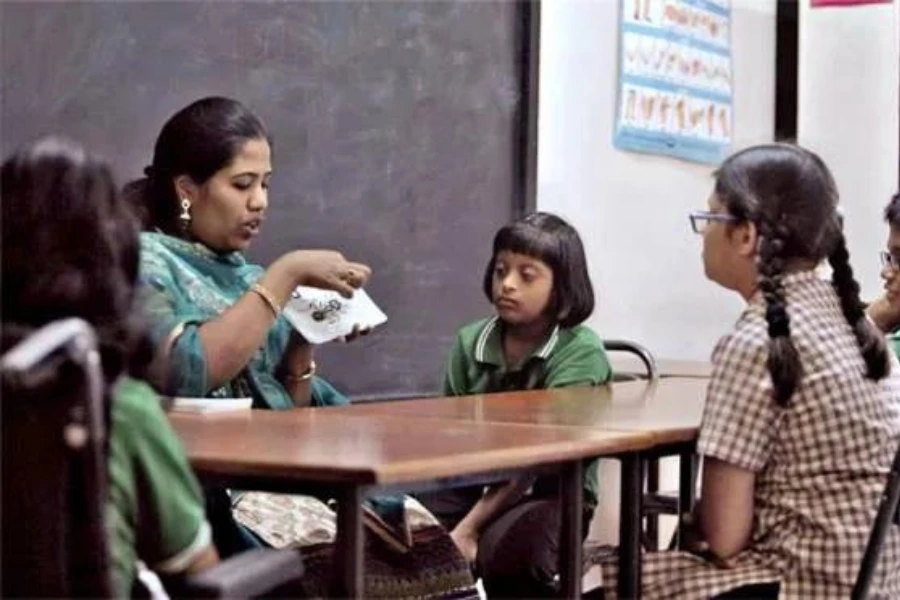
Source: eduwinnow
One must possess the Qualification of Special Educator to positively influence the lives of children with special needs. A reputable institution like Vidhyanidhi Education Society (Govt. Regd.) offers the course online or through distance learning. This Diploma in Special Education Needs allows aspiring educators to get the skills and information they need to serve kids with various learning difficulties while studying in the convenience of their own homes.
In this blog, we will explore the qualification of a Special Educator, along with the details of the special education course and the career opportunities that await in this field.
Career Scope for Special Educator
Embarking on the career path as a Special Educator is quite a challenging task but due to the high surge in the demand for trained special educators pursuing this career is now a rewarding career with excellent pay packages. Acquiring a Special Educator’s credential unlocks many different career roles at some of the most reputed educational Institutions across the country.
Along with working in Schools aspirants can also explore a wide array of lucrative job roles listed below and make a positive impact on the lives of young children enabling them to settle down comfortably in a normal classroom.
For more details on the SEN Course Call/Whatsapp at +919321024137 / +919869866277
To download the brochure of the SEN Course, Click Here!
Special Educator for Early/Pre-KG Classes
Working with young students at the early stage, Special Educators in early education concentrate on helping those with developmental delays or disorders. Their work ensures that students build crucial skills and are set up for future learning success.
Inclusive Educators for High Prevailing Special Educators for High-Incidence Disabilities
High-incidence disabilities, like learning disorders or mild intellectual disabilities, are more common. Special Educators customize individualized education Plans (IEP) to meet the needs of students with special needs, and to support them in achieving their potential academically and socially.
Inclusive Educator for Sensory Impairment Problems
Special Educator professionals in this segment cater to children who have exclusive challenges such as any visual e.g. eyesight and hearing impairments. Special Educators with the help of specific teaching methodologies devise lessons to support the academic needs of such children.
Counsellor for Emotional or Behavioural Disorders
Special Educators are responsible for the mental health of the child, especially in the school environment where children have to be empathetic toward each other display sympathy, and be helpful towards each other. They support students in cultivating coping strategies and provide life skills such as communication and emotional regulation that are vital for scholastic and personal development.
Autism Spectrum Disorder Tutor
Special Educators can also specifically work for children with ASD. They devise lesson plans and accordingly use the teaching aids that support the understanding sensibilities of the child enabling them to make use of the skills the child is best at.
As a Teacher for Future Special Educators
Certified Special Educators can also work as teachers for the upcoming special educators making sure that trainees understand all the concepts and to train aspirants to handle the varied needs of children effortlessly.
Special Educators when acquiring The Career Scope for Special Educators is vast, offering roles in schools, specialized centers, and training institutions, making it a rewarding path for those passionate about helping children succeed.
For more details on the SEN Course Call/Whatsapp at +919321024137 / +919869866277
To download the brochure of the SEN Course, Click Here!

Source: mrbusinessmagazine
How Long Does it Take to Become Special Educator?
Becoming a Special Educator typically takes about one year, depending on the course structure and mode of study. A Diploma in Special Education Needs is a common path to gaining the qualification of Special Educator. The program includes theoretical knowledge and practical training, equipping aspiring educators with the skills to support children with diverse needs. This one-year program can be completed through online or distance learning options.
What Skills are needed by Special Educator?
A Special Educator needs a diverse set of skills to effectively support students with varying needs. Beyond earning the right Qualification of Special Educator, it is essential to possess several core competencies that enable meaningful teaching and learning experiences.
Syllabus Devising
Inclusive Educators should be well-versed with the syllabus which is crucial for children with special needs. Accordingly, they have to devise lesson plans that cater to the learning needs of most of the students including those who have any learning disorders.
Patience
Working with children who have diverse learning needs requires patience. Special Educators must be calm and understanding as progress may come at different paces for each student.
Understanding Individual Needs
A deep understanding of each kid’s unique needs is essential. This skill is extremely important as it helps the trainee identify which method suits the child’s learning pattern the most and accordingly design lesson plans for him ensuring that the learning goals are achieved.
Raising the child’s morale by encouragement.
When the child feels confident to learn along with his counterparts in a regular classroom the self-esteem of the child gets a great boost which encourages him to strive better and work harder to rise above their challenges achieving their true potential.
Out of the Box teaching tactics
To hold the attention of the child by conducting engaging activities which are highly innovative is the key skill of the Special Educator ensuring that the child learns the concepts and topics clearly.
Adaptability
No Lesson plan or any IEP can be fully successful. There are times when a perfectly planned lesson and activity does not yield the desired effect so in such cases the teacher has to modify the lessons to suit the child’s changing needs.
All the above listed skills make a Special Educator confident to conduct a diverse classroom effectively giving the required support and attention to every child enabling him to thrive in a positive learning environment and lead a life of success and self-respect.
For more details on the SEN Course Call/Whatsapp at +919321024137 / +919869866277
To download the brochure of the SEN Course, Click Here!

Source: thehindu
What are the Duties of Special Educator?
A special educator’s role is both diverse and essential in providing quality education to students with varying needs. With the right qualifications, these professionals take on many critical responsibilities, to help each student succeed in their learning journey. Their dedication and skills are key to ensuring that every student receives the support and guidance they need to thrive.
Below are the key Duties of Special Educator that highlight their essential contribution to student development:
Develop and Maintain IEPs
One of the primary Duties of Special Educator is creating and regularly updating Individualized Education Programs (IEPs). These plans are specifically tailored to meet the unique learning needs of each student. Monitoring progress is essential to ensure the student is benefiting from the plan.
Example: A student with autism might have an IEP goal focused on improving social communication skills. The educator tracks the student’s interactions with peers and adjusts strategies based on progress reports every few months.
Preparing and Adapting Teaching Materials
To accommodate the wide range of skills exhibited by children with special needs, special educators craft and tailor learning resources and create instructional materials that are both interesting and easy to understand.
For instance, a teacher may modify worksheets and reading materials by making larger text and tactile visuals to help students who can’t see well to fully participate in class activities.
Advocating for Students
Often taking on the role of advocates, special educators work tirelessly to ensure that students get the help to receive resources, accommodations, and support they need for both academic and personal development.
Example: If a student with ADHD requires extra time on exams the Special Educator could team up with school administrators to ensure that this accommodation is provided consistently during standardized testing.
Data Collection and Progress Monitoring
One of the key tasks for any special educator involves collecting data to monitor students’ progress. Frequent evaluation enables the teacher to see how well the lessons are working and make any required modifications.
For instance, a special educator working with a child having dyslexia would monitor their comprehension and fluency skills once a week. After gathering information week by week the educator could modify reading interventions or recommend alternative approaches to enhance literacy.
Collaborating with Families, Teachers, and Students
Collaboration is crucial for a Special Educator’s success. They work closely with families, general education teachers, and students to create a supportive, well-rounded learning environment.
Example: A child with a learning disability may benefit from collaboration between the Special Educator and the general education teacher to implement differentiated instruction. The family is kept informed through regular meetings to discuss progress and goals.
Creating Accessible Learning Environments
Special Educators need to create an inclusive and learning classroom atmosphere that allows students of varying abilities to participate fully in learning activities.
Example: A child who uses a wheelchair may need changes in classroom seating preparations or accessible classroom technology, like speech-to-text tools, to make sure they can be involved with the program like their peers.
Meeting Government Standards
Special Educators must ensure their teaching practices comply with local or national regulations regarding special education. This includes maintaining proper certification and adhering to legal requirements for student support.
Example: A Special Educator may stay updated about changes to national laws like the Individuals with Disabilities Education Act (IDEA) to ensure that each child is receiving their allotted services and accommodations.
The Duties of Special Educator include a mixture of support, instruction, and collaboration to make sure that every child reaches their full potential.
Start your journey as a skilled Special Educator with Vidhyanidhi Education Society’s SEN Course!
For more details on the SEN Course Call/Whatsapp at +919321024137 / +919869866277
To download the brochure of the SEN Course, Click Here!
Qualification of Special Educator
FAQs
What is the Scope of Special Educator?
Special Educators can work in schools, special education centers, Remedial tutors, or as trainers, providing support to children with diverse learning needs.
What is needed to Become a Remedial Tutor?
One must complete a specialized course like the one offered by Vidhyanidhi Education Society to prepare you with the skills to support students with learning difficulties as a Remedial Tutor.
What is the Salary of a Special Educator in India?
In India the salary of a Special Educator ranges between 15000 to 30,000 depending upon the experience, location, and the type of institution, with opportunities for growth over time.



